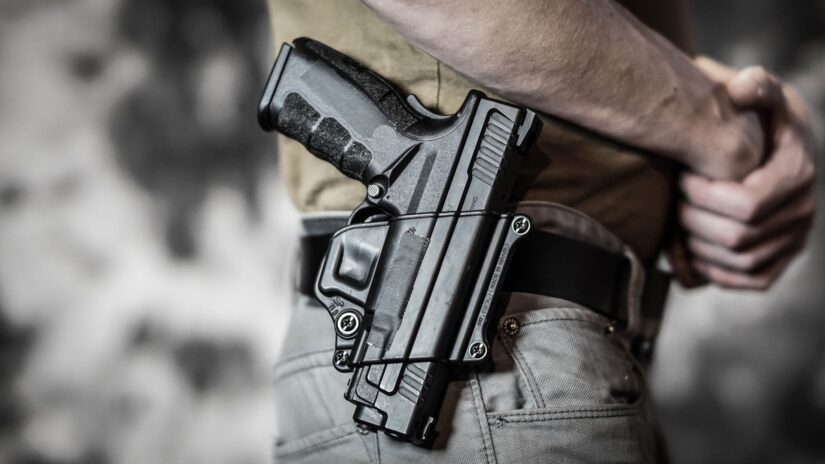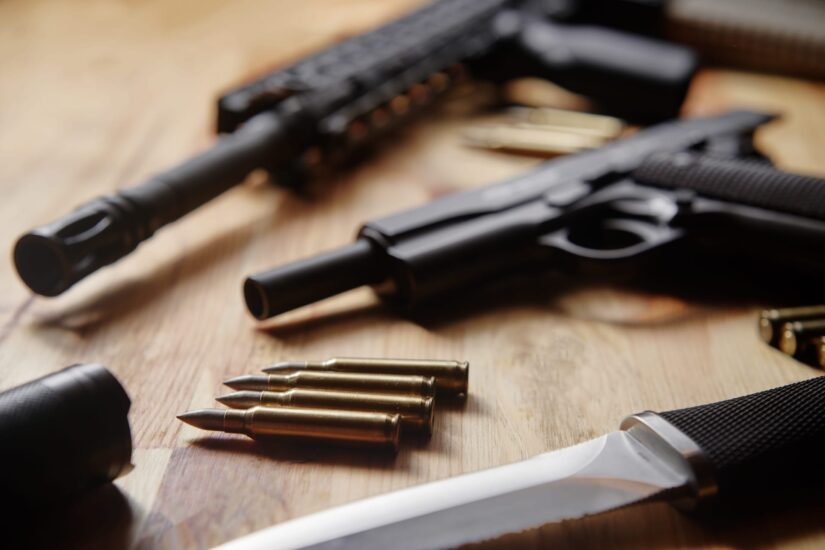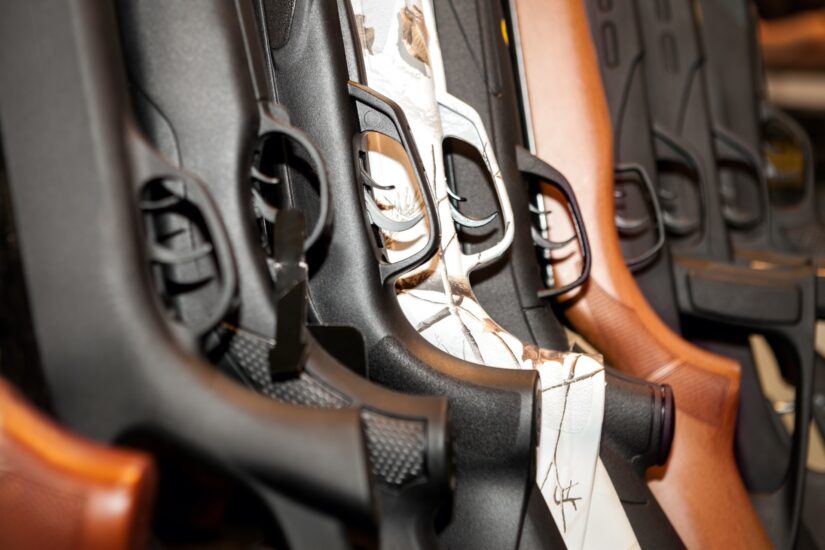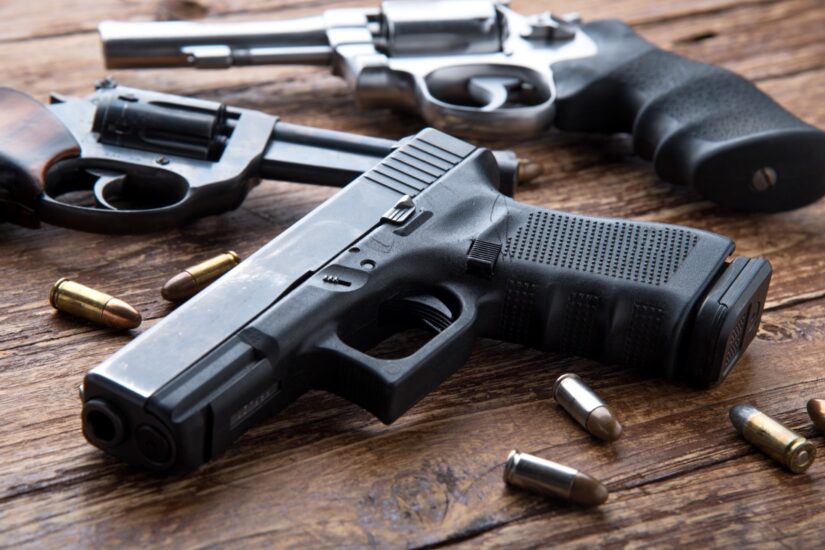
August 26, 2025
Violating Texas’s open carry laws can lead to costly fines, jail time, and long-term consequences like losing firearm rights or facing challenges in jobs and housing. While Texans aged 21+ can carry handguns without a license under the 2021 constitutional carry law, strict rules still apply.
Breaking these rules—like carrying in prohibited places or failing to use a holster—can result in penalties ranging from Class A misdemeanors (up to a $4,000 fine and one year in jail) to third-degree felonies (up to a $10,000 fine and 10 years in prison). Hiring a knowledgeable attorney is crucial to navigating these complex laws and protecting your future.
1. Unlawful Open Carry of a Handgun
Even under constitutional carry, open carry of a handgun remains illegal if specific legal requirements are not followed.
Statutory Reference
The rules around unlawful handgun carry are primarily outlined in Texas Penal Code Section 46.02. This statute defines the situations where carrying a handgun in public becomes illegal, even under constitutional carry laws. Additionally, Texas Penal Code Section 46.03 lists places where carrying a handgun is strictly prohibited, and Texas Penal Code Section 42.01(a) addresses disorderly conduct related to the display of firearms.
It’s important to note that if a handgun is visible, it must be secured in a holster. Failing to meet this requirement is considered a violation, regardless of whether the individual holds a License to Carry (LTC). Together, these statutes lay the foundation for how open carry violations are identified and penalized.
Misdemeanor or Felony Classification
Violations of Section 46.02 are generally classified as Class A misdemeanors. However, there are exceptions:
- Subsection (a-4) offenses: Classified as Class C misdemeanors.
- Subsection (a-7) offenses: These can escalate to second- or third-degree felonies, depending on the specific circumstances outlined in Section 46.04.
This distinction matters because misdemeanor convictions typically result in lighter penalties, while felony convictions carry much harsher consequences, including long-term impacts on a person’s life.
Fine Range (USD)
The fines for unlawful open carry depend on the severity of the offense:
| Offense Level | Fine Range (USD) |
| Class A Misdemeanor | Up to $4,000 |
| Third-Degree Felony | Up to $10,000 |
Jail or Prison Sentences
In addition to fines, incarceration terms vary based on the seriousness of the charge:
- Class A misdemeanors: May result in up to one year in county jail.
- Third-degree felonies: Carry prison sentences ranging from two to ten years.
Longer sentences are typically imposed in cases involving aggravating factors, such as carrying a firearm in a prohibited location.
Long-Term Consequences
The impact of a conviction goes beyond immediate fines and jail time. Individuals may face lasting challenges, including:
- Difficulty finding employment or housing
- Loss of firearm rights
- Obstacles in obtaining professional licenses
- Adverse effects on immigration status
- Complications in child custody cases
- Social stigma, which can harm personal and community relationships
These collateral effects can significantly alter a person’s life long after the legal penalties have been served.

2. Open Carry in Prohibited Places
In Texas, carrying a firearm is strictly forbidden in certain locations, regardless of constitutional carry laws or whether an individual holds a License to Carry (LTC).
Statutory Reference
Texas Penal Code Section 46.03 lays out a comprehensive list of places where firearms are not allowed.
These restrictions aim to maintain public safety in areas deemed high-risk for firearm possession.
Prohibited locations include a variety of public and private spaces, such as:
- Schools and universities
- Polling places during elections
- Courthouses and government buildings
- Secured airport areas
- Businesses that earn 51% or more of their income from alcohol sales
- Sporting events
- Correctional facilities and civil commitment centers
- Hospitals and mental hospitals
- Amusement parks and racetracks
- Government meetings
Additionally, private property owners can ban firearms on their premises by providing proper notice, either verbally or through specific written communication as required by law.
The penalties for violating these restrictions depend on the location and circumstances of the offense.
Misdemeanor/Felony Status
Violations of Section 46.03 are generally classified as third-degree felonies, except for certain locations like sporting events, hospitals, amusement parks, and government meetings where the offense is treated as a Class A misdemeanor. For cases involving place-restricted knives, the charge is a Class C misdemeanor.
For example, carrying a handgun into schools or establishments licensed for alcohol sales automatically results in a third-degree felony.
Fine Range (USD)
The financial penalties for these offenses vary based on their classification:
| Offense Level | Maximum Fine (USD) |
| Class C Misdemeanor | $500 |
| Class A Misdemeanor | $4,000 |
| Third-Degree Felony | $10,000 |
Jail/Prison Range
Texas takes these violations seriously, with incarceration terms reflecting the severity of the offense:
- Class C misdemeanors: No jail time.
- Class A misdemeanors: Up to one year in county jail.
- Third-degree felonies: Prison sentences ranging from two to ten years.
Third-degree felony convictions include a mandatory minimum of two years in state prison, while Class A misdemeanors may result in up to one year in a county facility.
Collateral Consequences
The impact of these violations extends beyond fines and jail time. A conviction for carrying a firearm in a prohibited place can have long-term consequences, particularly for career prospects. Many professional licenses, including those in healthcare, education, finance, and law, become difficult or even impossible to obtain. This can derail career goals and limit earning potential for years after the sentence is served.

3. Improper Conduct with Long Guns
In Texas, individuals who meet the legal requirements are allowed to carry long guns. However, actions like brandishing or firing these firearms in a manner that causes public alarm are strictly prohibited.
Statutory Reference
According to Texas Penal Code Section 42.01(a), it is considered an offense to intentionally or knowingly display a firearm in public in a way that causes alarm to others. This includes carrying long guns in a threatening manner, such as pointing or brandishing them at others. Additionally, discharging a firearm in public is illegal unless it is done in self-defense. It is also against the law to knowingly fire a gun over occupied buildings, on paved public roads, highways, or streets, as well as on property primarily used as residences or zoned for residential use.
Misdemeanor/Felony Status
The severity of charges for improper conduct with long guns depends on whether the firearm is discharged. Reckless behavior without firing the weapon is typically classified as a Class A misdemeanor, whereas firing the weapon escalates the offense to a third-degree felony. The distinction hinges on whether the firearm was merely displayed or actually discharged.
Fine Range (USD)
- Class A misdemeanor: Fines can go up to $4,000.
- Third-degree felony: Fines may reach as high as $10,000.
Jail/Prison Range
The potential jail or prison time also varies based on the offense:
- Class A misdemeanor: Punishable by up to one year in county jail.
- Third-degree felony: Carries a sentence of two to ten years in prison, with a mandatory minimum of two years.
These penalties are not just immediate but can also have lasting consequences.
Collateral Consequences
A felony conviction for improper conduct with long guns can lead to long-term repercussions beyond fines and incarceration. These include the permanent loss of firearm rights and restrictions on future employment or legal opportunities. Even in cases where self-defense is claimed, reckless actions that unnecessarily alarm the public can result in serious charges and penalties.
Legal Representation vs. Self-Representation
When dealing with open carry violation charges in Texas, you essentially have two choices: represent yourself or hire a seasoned criminal defense attorney. This decision can significantly influence the outcome of your case. Given the complexity of these laws, having professional guidance can make all the difference.
Understanding the Complexity
Texas open carry laws are far from straightforward. They include detailed rules about where and how firearms can be carried. Misinterpreting or misunderstanding these regulations can lead to severe consequences, including hefty penalties, felony charges, and even prison time.
The Risks of Self-Representation
Choosing to represent yourself in an open carry violation case comes with substantial risks. You might miss critical deadlines, fail to follow courtroom protocols, or overlook valid defenses. For instance, defenses related to a lack of knowledge about prohibited areas, the absence of intent to break the law, or even technicalities like improper holstering might go unnoticed. A conviction in such cases could leave a lasting mark on your record, potentially affecting job opportunities, housing options, and even your future ability to own firearms.
Why Professional Legal Representation Matters
Hiring an experienced attorney offers a range of benefits that self-representation simply cannot match. A skilled defense lawyer brings in-depth knowledge of the law, can scrutinize evidence for procedural errors, and crafts a defense strategy tailored to your specific situation. Additionally, their negotiation skills can lead to outcomes like reduced charges or even case dismissals results that are challenging to achieve on your own.
| Aspect | Self-Representation | Professional Legal Representation |
| Legal Knowledge | Limited understanding of firearms laws | Expertise in Texas open carry regulations |
| Defense Strategy | May overlook viable defenses | Identifies all potential defenses and legal nuances |
| Negotiation Power | Minimal ability to negotiate | Skilled in reducing charges or securing dismissals |
| Courtroom Experience | Unfamiliar with legal procedures | Extensive trial and courtroom expertise |
| Evidence Analysis | Likely to miss critical details | Thorough review of evidence and procedural errors |
| Emotional Support | Handling the case alone | Ongoing guidance and reassurance throughout |
This comparison underscores how hiring an experienced attorney can greatly improve your chances of a favorable outcome.

The Napier Law Firm Advantage
For cases involving open carry violations, The Napier Law Firm stands out by offering 24/7 support and personalized defense strategies. Their focus on firearms-related charges equips them to handle the unique challenges of these cases. With free consultations, they provide immediate access to legal advice when you need it most. Their deep knowledge of Texas criminal defense law ensures every aspect of open carry regulations is carefully addressed.
George Napier’s prior experience as a prosecutor gives him a unique edge. He understands how the prosecution operates, enabling him to anticipate their moves and build a strong defense strategy.
Why Timing Is Key
If you’re facing open carry violation charges, acting quickly is critical. Legal experts recommend avoiding any admission of guilt and contacting a criminal defense attorney before speaking to law enforcement. The sooner you secure professional representation, the better your chances of protecting your rights and achieving a positive outcome.
Protecting Your Rights After an Open Carry Violation in Texas
Open carry violations in Texas can lead to serious legal and personal consequences—from steep fines and jail time to long-term restrictions on your right to possess firearms. While the state allows permitless carry for most adults, it enforces strict rules about how and where guns may be carried. Even an accidental violation—such as unknowingly entering a restricted area—can result in a Class A misdemeanor or worse.
If you’re facing charges, it’s critical to act quickly. A conviction can affect more than your criminal record; it can limit job prospects, housing opportunities, and future firearm ownership. The legal system surrounding Texas gun laws is complex, but with the right legal counsel, there may be strong defenses available.
At The Napier Law Firm, we understand what’s at stake. Our team is available 24/7 and has deep experience handling firearms-related cases. We’ll work to protect your rights, challenge the evidence, and pursue the best possible outcome—whether that means a reduced charge, dismissal, or acquittal.Don’t leave your future to chance. Contact The Napier Law Firm today to start building a strong defense.